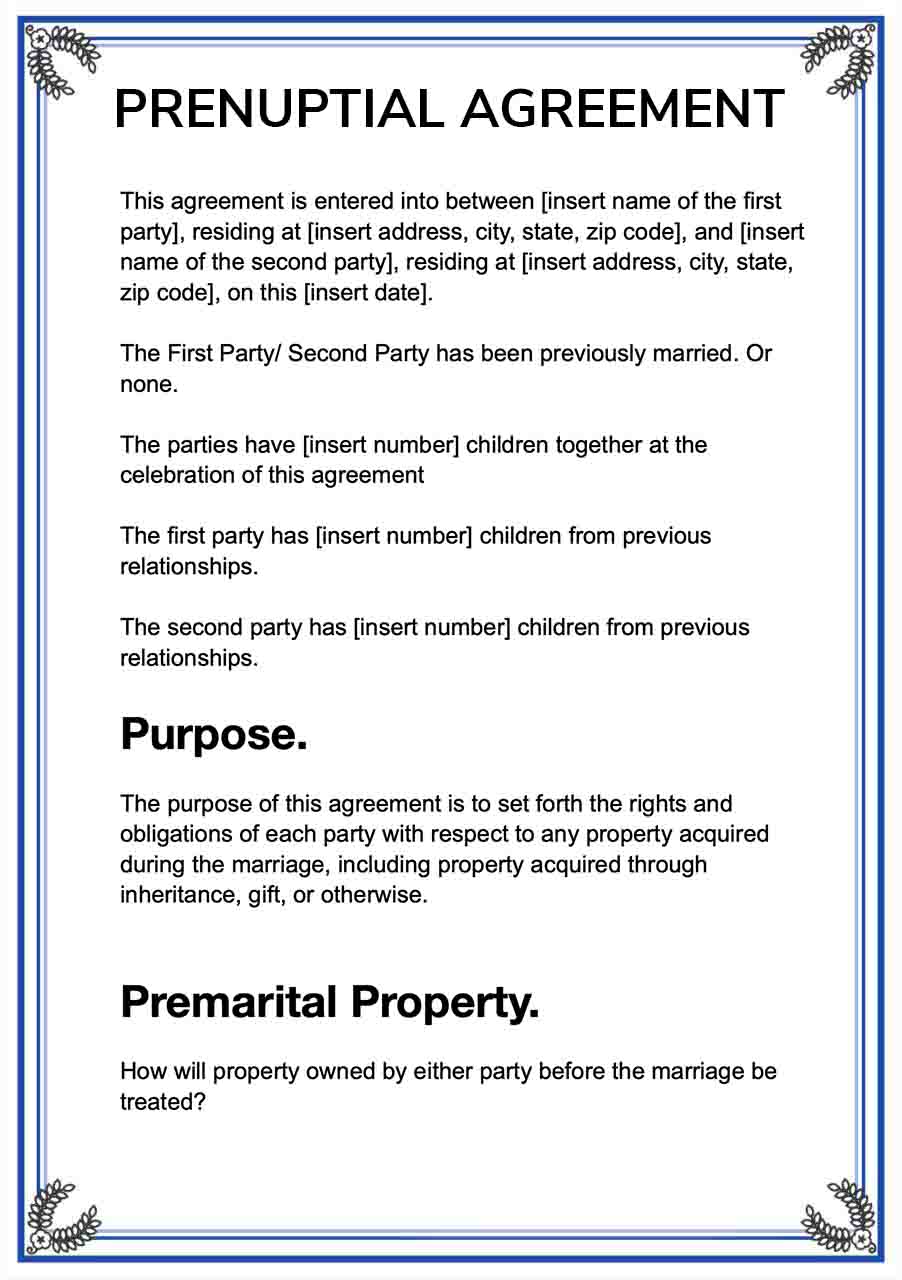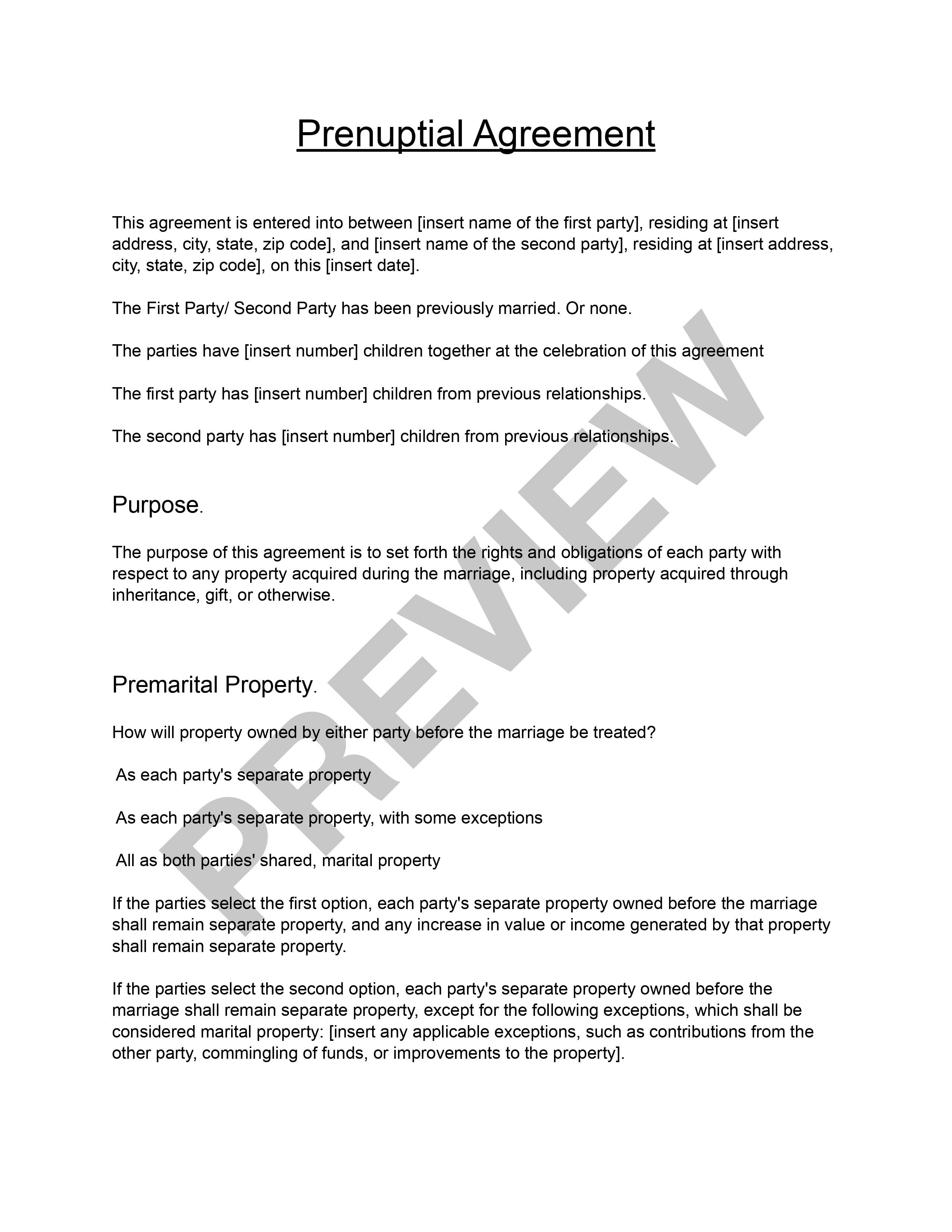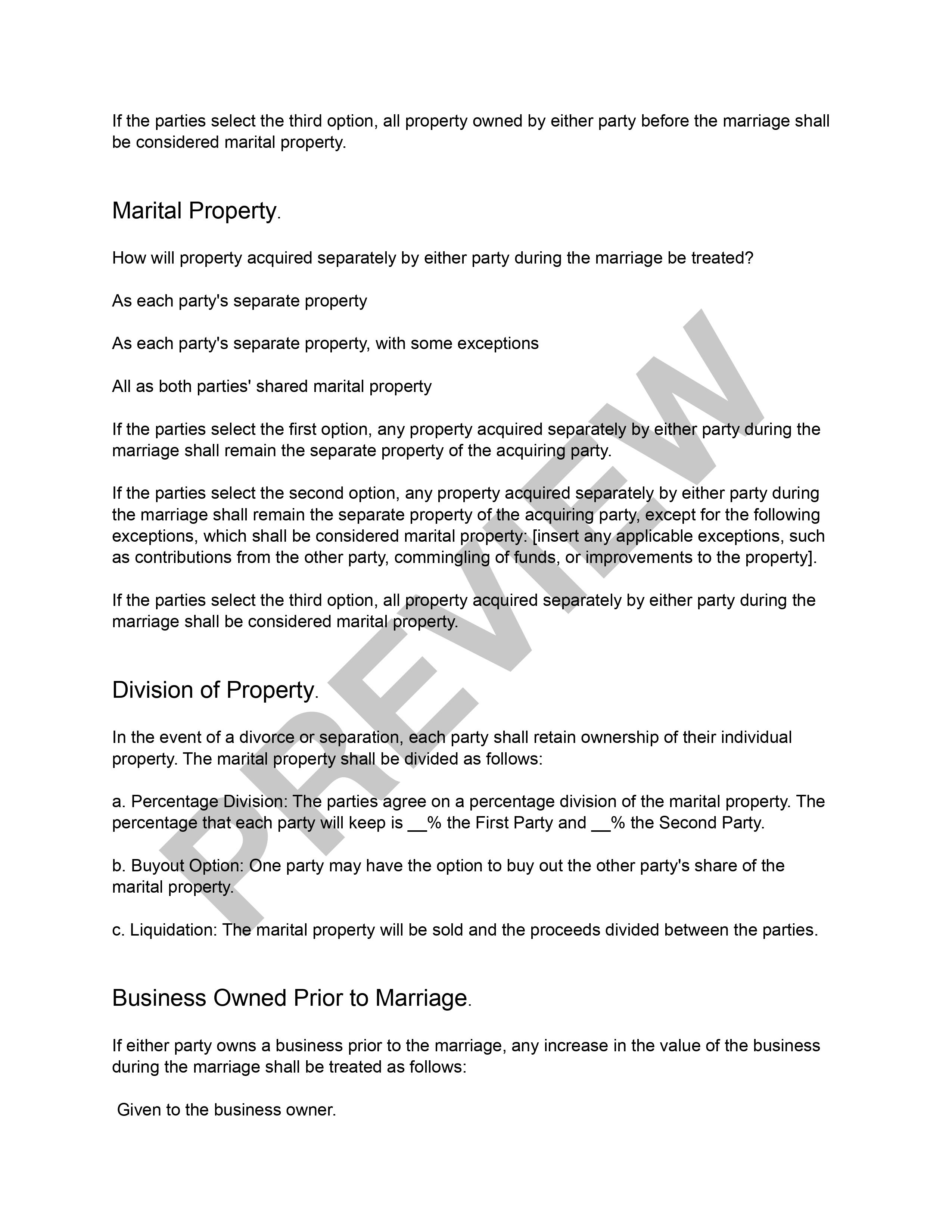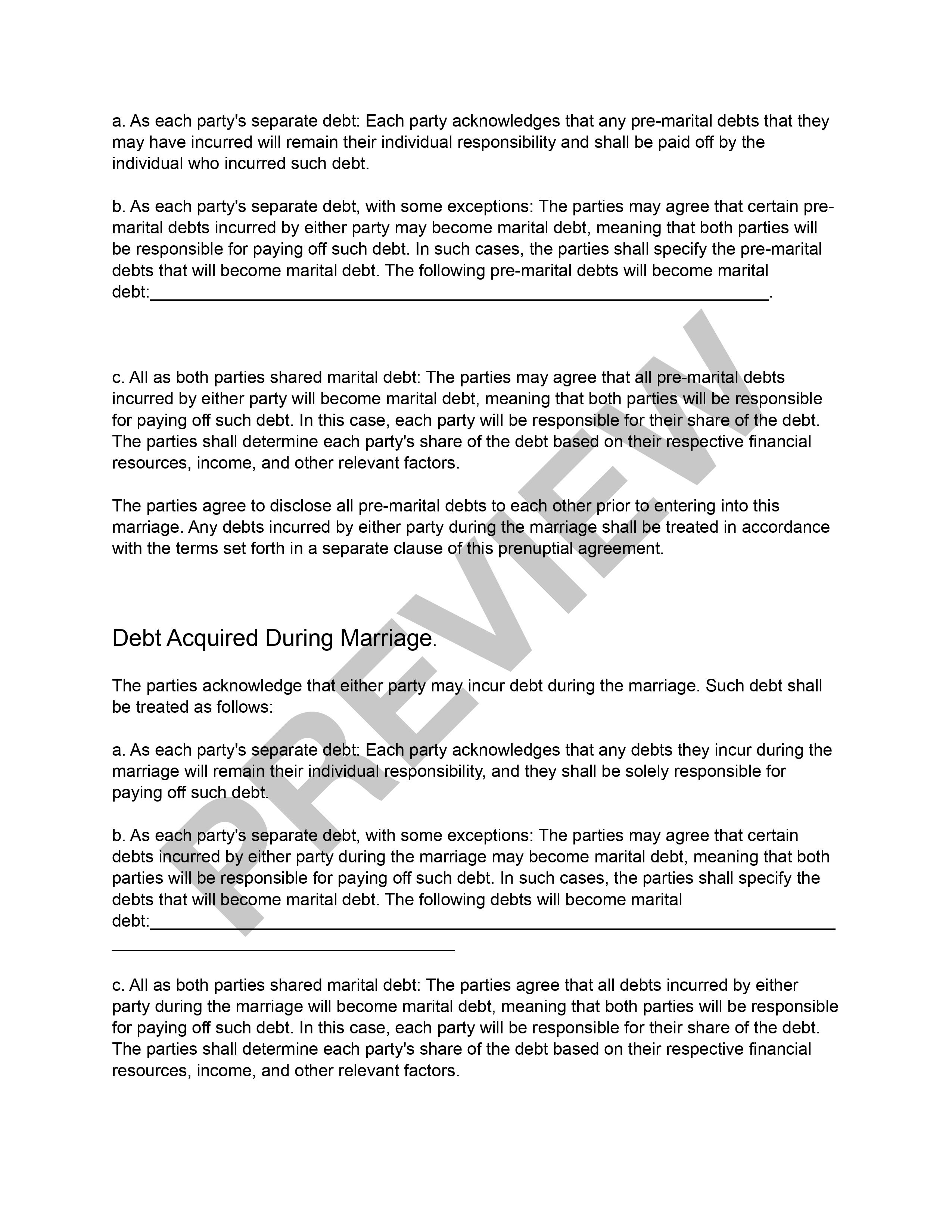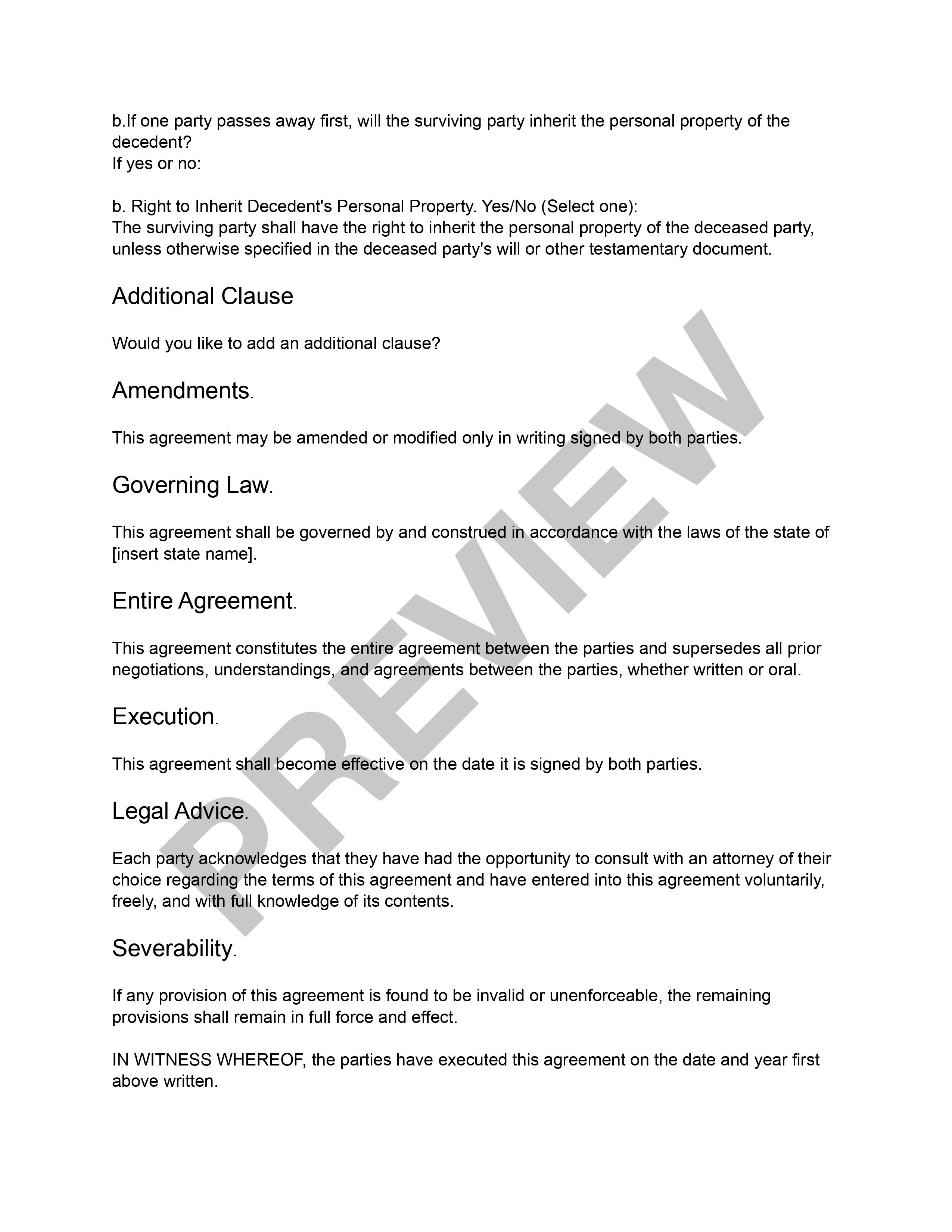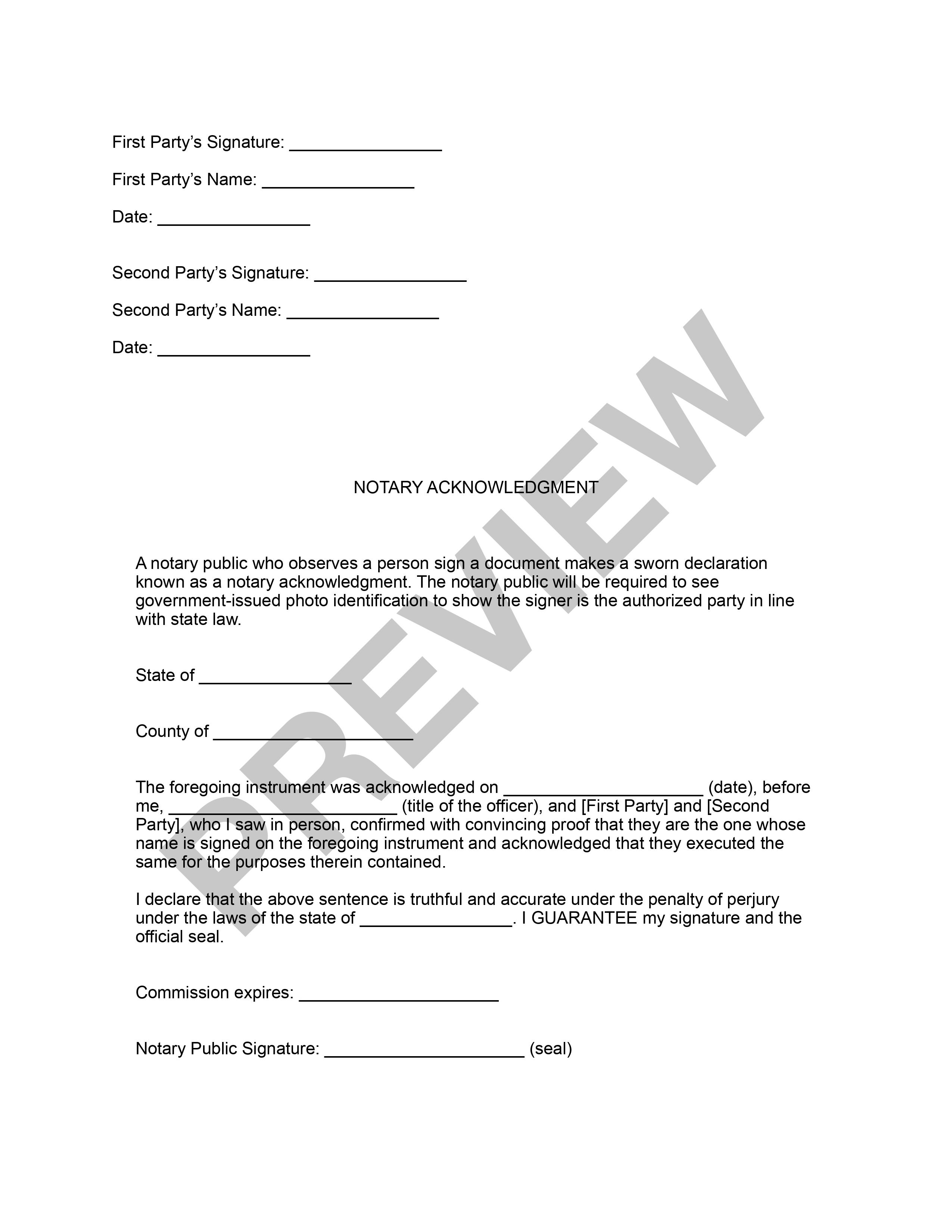Generate Prenuptial Agreement
A prenuptial agreement is a legal contract between two individuals who plan to marry, which outlines the division of assets and property in the event of divorce, separation, or death. It is used to protect the financial interests of both parties.
Last Updated April 2023
What is a Prenuptial Agreement?
A Prenuptial Agreement (also known as a prenup or premarital agreement) is a legal agreement between two individuals who are planning to get married. This agreement is created prior to the marriage and outlines the division of assets and property in case of a divorce, separation or death.
A prenuptial agreement typically includes details about the ownership and division of property, assets, debts, and financial support in the event of a divorce or legal separation. It can also specify how property acquired during the marriage will be distributed, whether alimony or spousal support will be paid, and any other financial arrangements agreed upon by both parties.
Prenuptial agreements are often used by individuals who have significant assets or financial obligations that they wish to protect, or for individuals who have been married before and want to ensure that their assets are protected for their children from a previous relationship.
Who should get a Prenuptial Agreement?
There is no one-size-fits-all answer to who should get a prenuptial agreement, as it ultimately depends on each individual's specific circumstances and needs. However, prenuptial agreements are commonly recommended for individuals who:
-
Have significant assets or property that they wish to protect in case of divorce or separation.
-
Own a business or professional practice that they want to ensure remains separate property.
-
Have children from a previous relationship that they want to protect their inheritance for.
-
Are entering into a marriage with someone who has significant debt or financial obligations.
-
Want to avoid costly and lengthy court battles over property division and financial support in case of divorce or separation.
-
Want to ensure transparency and open communication about financial matters in their marriage.
Ultimately, anyone who wants to protect their financial interests and assets in the event of a divorce or separation should consider getting a prenuptial agreement. It's important to consult with an attorney to determine if a prenuptial agreement is appropriate for your situation and to ensure that the agreement meets all legal requirements.
What should I include in my Prenuptial Agreement?
The specific terms and provisions of a prenuptial agreement will vary depending on the individual circumstances of each couple, but some common items that should be included in a prenuptial agreement are:
-
A complete and accurate list of all assets and liabilities owned by each party before the marriage.
-
A statement of how any property or assets acquired during the marriage will be divided in the event of a divorce or separation.
-
Provisions for spousal support or alimony payments in case of a divorce or separation.
-
The distribution of any jointly owned property and assets in case of a divorce or separation.
-
Protection of any family inheritance or business assets that one party may have brought into the marriage.
-
A statement of each party's financial responsibilities during the marriage, such as paying bills or debts.
-
A dispute resolution clause outlining how any conflicts or disagreements will be resolved.
-
A statement of what state law will govern the prenuptial agreement and any subsequent divorce or separation proceedings.
It is crucial to include all necessary terms and provisions in a prenuptial agreement to ensure that it is legally binding and effective in protecting your assets and financial interests in case of a divorce or separation.
Why should I get a Prenuptial Agreement?
There are several reasons why you might consider getting a prenuptial agreement:
-
Protection of assets: A prenuptial agreement can help protect your assets in case of divorce or separation, ensuring that you keep what is rightfully yours.
-
Financial transparency: A prenuptial agreement can encourage financial transparency and open communication between you and your partner, which can help to build trust and avoid misunderstandings.
-
Business ownership: If you own a business, a prenuptial agreement can help protect your business interests and prevent any potential disputes over ownership or control in the event of divorce.
-
Protecting children's inheritance: If you have children from a previous relationship, a prenuptial agreement can help ensure that their inheritance is protected and that they receive what is rightfully theirs.
-
Avoiding lengthy court battles: A prenuptial agreement can help avoid lengthy court battles over property division and financial support in case of divorce, potentially saving both time and money.
-
Peace of mind: A prenuptial agreement can provide peace of mind, knowing that your financial interests and assets are protected, and that any potential disputes will be resolved in a fair and equitable manner.
Ultimately, a prenuptial agreement can provide protection and peace of mind in case of divorce or separation, allowing you to focus on building a happy and healthy marriage.
Frequently Asked Questions
No, a prenuptial agreement is not only for the wealthy. While prenuptial agreements are commonly associated with high-net-worth individuals and celebrities, they can be useful for anyone who wants to protect their financial interests and assets in case of divorce or separation.
Prenuptial agreements can be particularly important for individuals who own a business, have children from a previous relationship, or want to ensure transparency and open communication about financial matters in their marriage.
Additionally, prenuptial agreements can be useful for couples with more modest means who want to ensure that their finances are protected and that any potential disputes are resolved in a fair and equitable manner.
Ultimately, anyone who wants to protect their financial interests and assets in the event of a divorce or separation should consider getting a prenuptial agreement, regardless of their level of wealth. It's important to consult with an attorney to determine if a prenuptial agreement is appropriate for your situation and to ensure that the agreement meets all legal requirements.
In most cases, a prenuptial agreement is enforceable in court as long as it meets certain legal requirements. To be enforceable, a prenuptial agreement must be:
- In writing: The agreement must be in writing and signed by both parties.
- Voluntary: Both parties must enter into the agreement voluntarily and without coercion.
- Fair and reasonable: The terms of the agreement must be fair and reasonable at the time of execution and at the time of enforcement.
- Legal capacity: Both parties must have the legal capacity to enter into a contract.
- No fraud, duress, or undue influence: The agreement must not have been entered into as a result of fraud, duress, or undue influence.
It's important to note that a prenuptial agreement cannot waive child support obligations or violate public policy. If a prenuptial agreement is found to be unconscionable or fails to meet any of the above legal requirements, it may not be enforceable in court.
No, a prenuptial agreement cannot include provisions for child custody and support. Child custody and support are matters that are decided based on the best interests of the child at the time of a divorce or separation, and cannot be predetermined in a prenuptial agreement.
Courts have the authority to modify or disregard provisions in a prenuptial agreement that relate to child custody or support if they are not in the best interests of the child. Therefore, any provisions related to child custody or support in a prenuptial agreement would not be enforceable.
It's important to understand that child custody and support are separate legal matters from property division and spousal support, which can be included in a prenuptial agreement.
Yes, a prenuptial agreement can be amended or revoked, but the process for doing so will depend on the terms of the agreement and the laws of the state where the agreement was executed.
If both parties agree to make changes to the prenuptial agreement, they can execute an amendment or addendum to the original agreement that outlines the new terms. This amendment must meet the same legal requirements as the original prenuptial agreement, including being in writing and signed by both parties.
To revoke a prenuptial agreement, one party must typically file a written revocation or termination with the court and serve the other party with a copy. In some states, a prenuptial agreement may be automatically revoked upon divorce or legal separation, but this will depend on the specific laws of the state.
There are several situations in which you may want to consider getting a prenuptial agreement:
- You have significant assets: f you have significant assets such as property, investments, or a business, a prenuptial agreement can help protect those assets in the event of a divorce.
- You have children from a previous relationship: If you have children from a previous relationship, a prenuptial agreement can help ensure that your children's inheritance is protected.
- You have a large income disparity: If you and your partner have a significant income disparity, a prenuptial agreement can help ensure that the lower-earning spouse is provided for in the event of a divorce.
- You want to protect your inheritance: If you are expecting to receive a significant inheritance, a prenuptial agreement can help ensure that those assets are protected and remain separate property.
- You want to define financial expectations: A prenuptial agreement can help define financial expectations and responsibilities during the marriage, which can help reduce conflict and misunderstandings.
It's important to note that prenuptial agreements are not just for the wealthy. If you have any concerns about protecting your assets or financial interests, it may be worth considering a prenuptial agreement. It's recommended that you consult with an experienced attorney to discuss your specific situation and determine if a prenuptial agreement is right for you.
